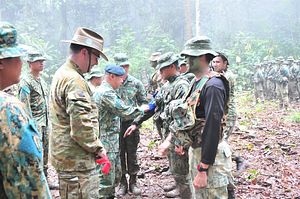Last week, Australia and Brunei held another iteration of their joint defense working committee meeting. The engagement highlighted the ongoing efforts by both sides to continue to develop the defense aspect of their relationship.
As I have noted before in these pages, Australia and Brunei have long had a defense relationship as part of their wider bilateral ties that date back to when Brunei gained its full independence from Britain in 1984. Defense collaboration was formalized via a memorandum of understanding on defense cooperation inked in 1999, and covers various areas such as visits, exchanges, training, exercises, and information exchange involving key services.
Among the defense interactions between the two sides set up following the signing of the defense MOU is the Joint Defense Working Committee (JDWC) Meeting. The JDWC is meant to provide an opportunity for both sides to foster their defense relations and discuss aspects of security collaboration.
Last week, both sides held another iteration of their JDWC. The 17th JDWC meeting between Brunei and Australia was held at HMAS Moreton in Brisbane, Australia, and it was co-chaired by Ximena Morrisby, the acting assistant secretary for Southeast Asia at the International Policy Division of Australia’s defense department, and Haji Adi Ihram bin Dato Paduka Haji Mahmud, the director of defense Policy at Brunei’s defense ministry.
As with previous iterations, during the JDWC, both sides used the opportunity to discuss regional security issues of mutual concern as well as issues related to the bilateral defense relationship. The official account by Brunei’s defense ministry (MINDEF) provided few specifics but said the countries had discussed matters including “regional security dynamics” and the “framework of their bilateral defense engagement.” They also discussed shared multilateral engagements, with a case in point being within the ASEAN Defense Ministers Meeting-Plus (ADMM-Plus) process where Brunei and Australia will become co-chairs of the ADMM-Plus Experts’ Working Group on Military Medicine for the upcoming 2020-2023 cycle.
Apart from the JDWC talks themselves, both sides had other engagements as well. For instance, as part of the JDWC program, the Brunei delegation visited the Gallipoli Barracks to witness Exercise Mallee Bull, a bilateral exercise conducted between the Royal Brunei Land Force and Australian Army and interact with the personnel involved. The delegation also visited the ANZAC Memorial Square for a wreath laying session as well and paid respects to lives lost during the Second World War.
To be sure, the JDWC is just one of several defense-related engagements between Australia and Brunei. Nonetheless, how both sides look to operationalize some of the strategic areas of priority identified as well as the avenues of collaboration mentioned will continue to be a point of focus for the rest of 2019 and on into 2020.

































